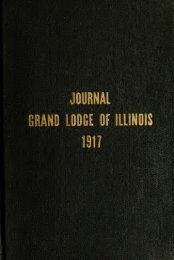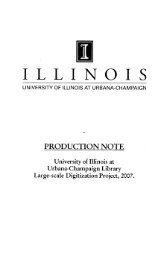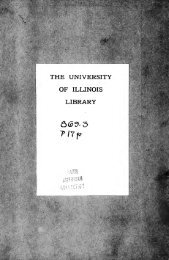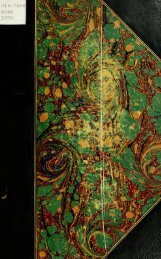332 FIELDIANA: ANTHROPOLOGY, VOLUME 56As was the case with the Russian period, precisely what the tradershad to offer the people <strong>in</strong> terms of material goods is not known <strong>in</strong>detail. Merchandise <strong>in</strong>ventories for the Nushagak post have notturned up <strong>in</strong> any of the archival depositories where records of theAlaska Commercial Company are known to exist and it seems fairlycerta<strong>in</strong> that these records were destroyed <strong>in</strong> the San Francisco earthquakeand fire. From scattered sources, however, it is possible topiece together an uncerta<strong>in</strong> picture of popular trade items <strong>in</strong> southwesternAlaska as a whole dur<strong>in</strong>g the early phases of the Americanperiod. E. W. Nelson mentions that when he traveled from St. Michaelto the mouth of the Kuskokwim River <strong>in</strong> 1878 he took along"leaf tobacco, ammunition, beads, brass jewelry, needles and othersmall wares" <strong>in</strong> order to purchase ethnographic specimens (Nelson,1882, p. 661). In the 1880's the Moravian missionary W. H. We<strong>in</strong>landlisted tobacco, tea, drill<strong>in</strong>g, needles, powder, lead, knives, axes,hardtack, tw<strong>in</strong>e for fish nets, sugar, flour, cook<strong>in</strong>g utensils, old armymuskets, and sheet iron tea kettles as the most popular trade items(Oswalt, 1963, pp. 110-111).We have previously noted the extensive<strong>in</strong>ventory of the Alaska Commercial Company post at Tyonek<strong>in</strong> 1902, but it is doubtful if Nushagak had a similar <strong>in</strong>ventory early<strong>in</strong> the American period. Dur<strong>in</strong>g the 1870's and 1880's it seems certa<strong>in</strong>that the people of <strong>Tikchik</strong> and other <strong>village</strong>s <strong>in</strong> the area possessedthe material apparatus of aborig<strong>in</strong>al Eskimos with the additionof relatively few trade items.One possible source of trade goods for all the Nushagak RiverEskimos was from the prospectors and m<strong>in</strong>ers who searched for goldalong the river and its tributaries. Actually the Nushagak Rivernever played an important part <strong>in</strong> the m<strong>in</strong><strong>in</strong>g history of Alaska.No major stampedes were ever recorded for the river and the Nushagakwas never an access route to any important gold fields. Andyet, as early as 1887 prospectors were mak<strong>in</strong>g their way up the riverand concentrat<strong>in</strong>g their activities along the Mulchatna. Undoubtedly,some of these prospected along the Nuyakuk and may havevisited <strong>Tikchik</strong>. But they were very few <strong>in</strong> number and probablyhad little to offer the Eskimos <strong>in</strong> the way of trade goods. The veryfact that a few m<strong>in</strong>ers may have reached the <strong>village</strong> and perhapstraded some of their possessions for meat and fish merely emphasizesthe rarity of contact between Eskimos and whites <strong>in</strong> this area up tothe turn of the <strong>century</strong>.Of far greater impact on allthe peoples of the Nushagak Riverregion was the commercial fish<strong>in</strong>g <strong>in</strong>dustry that began to develop <strong>in</strong>
VANSTONE: TIKCHIK VILLAGE 333Bristol Bay dur<strong>in</strong>g the n<strong>in</strong>th decade of the last <strong>century</strong>.This remarkable<strong>in</strong>dustry, one of the most significant commercial developments<strong>in</strong> the entire history of Alaska, from its very <strong>in</strong>ception broughtsignificant and far-reach<strong>in</strong>g changes to the area. In the last twodecades of the <strong>n<strong>in</strong>eteenth</strong> <strong>century</strong> it was responsible for br<strong>in</strong>g<strong>in</strong>gabout major seasonal fluctuations of population which brought theEskimos of even the remotest <strong>village</strong>s <strong>in</strong>to first-hand contact withmany different races and nationalities.There are five species of Pacific salmon ;the k<strong>in</strong>g or ch<strong>in</strong>ook, thered or sockeye, the p<strong>in</strong>k or humpback, the chum or dog, and the silveror coho.All these salmon make spawn<strong>in</strong>g runs <strong>in</strong>to the rivers ofBristol Bay, but it is the red salmon that is the most important fromThe rivers flow<strong>in</strong>g <strong>in</strong>to the bay are thea commercial standpo<strong>in</strong>t.greatest red salmon spawn<strong>in</strong>g grounds <strong>in</strong> the world because these fishspawn only <strong>in</strong> lakes or <strong>in</strong> streams that flow <strong>in</strong>to or out of lakes. Itso happens that most of the rivers flow<strong>in</strong>g <strong>in</strong>to Bristol Bay havenumerous lakes at their headwaters.The earliest fish<strong>in</strong>g by Euro -Americans <strong>in</strong> Nushagak Bay wasfor salt<strong>in</strong>g purposes and was carried out by the Alaska CommercialCompany (Petroff, 1884, p. 16). It was the <strong>in</strong>vention of the cann<strong>in</strong>gprocess, however, that provided a means by which the Alaska salmonruns could be utilized more fully, and between 1883 and 1903 tencanneries were constructed at various po<strong>in</strong>ts on Nushagak Bay (Moser,1899, pp. 173-174; Cobb, 1931, pp. 462-463; Hawk<strong>in</strong>s andDaugherty, 1958, p. 17).From the beg<strong>in</strong>n<strong>in</strong>g there appears to have been little or no effortmade to utilize the local labor supply <strong>in</strong> the salmon cann<strong>in</strong>g <strong>in</strong>dustry.Most of the actual fish<strong>in</strong>g was done by Euro-Americans, while work<strong>in</strong> the canneries was done by Ch<strong>in</strong>ese laborers. As might be expected,however, large numbers of Eskimos were attracted to NushagakBay dur<strong>in</strong>g the fish<strong>in</strong>g seasons and tent settlements sprang upnear the canneries every summer (Gregory and Barnes, 1939, p. 27).Gradually, though, some Eskimos were able to obta<strong>in</strong> employment<strong>in</strong> the canneries even dur<strong>in</strong>g the earliest years of the <strong>in</strong>dustry <strong>in</strong> spiteof what was obviously considerable prejudice aga<strong>in</strong>st them and theirabilities as workers. In the early 1890's, for example, Eskimo canneryworkers <strong>in</strong> Nushagak Bay were averag<strong>in</strong>g $48.50 per monthdur<strong>in</strong>g an average period of operation of 63 days (Porter, 1893, p. 218)and <strong>in</strong> 1900 the two canneries at Nushagak <strong>village</strong> employed 70 localpeople as opposed to 193 Ch<strong>in</strong>ese (Moser, 1902, pp. 203-204). Thefact is that even when Ch<strong>in</strong>ese contract labor was readily available.
- Page 2 and 3:
-;«.>*;>'-^!^fe'*«*w*^=LIBRARY OF
- Page 6 and 7:
. •>.. «-;•* - . Ti'-mtfT^-iif
- Page 12 and 13:
Ivan Ishnook, the last Tikchik surv
- Page 14 and 15:
Library of Congress Catalog Card Nu
- Page 16 and 17:
Listof IllustrationsIvan Ishnook, t
- Page 18 and 19:
216 FIELDIANA: ANTHROPOLOGY, VOLUME
- Page 20 and 21:
218
- Page 22 and 23:
c^^NtKushaqakfOdinochka-, Lake,.Lna
- Page 24 and 25:
Tikchik Village inHistoryThe meanin
- Page 26 and 27:
224 FIELDIANA: ANTHROPOLOGY, VOLUME
- Page 28 and 29:
226 FIELDIANA: ANTHROPOLOGY, VOLUME
- Page 30 and 31:
228 FIELDIANA: ANTHROPOLOGY, VOLUME
- Page 32 and 33:
230 FIELDIANA: ANTHROPOLOGY, VOLUME
- Page 34 and 35:
232
- Page 36 and 37:
234 FIELDIANA: ANTHROPOLOGY, VOLUME
- Page 38 and 39:
236 FIELDIANA: ANTHROPOLOGY, VOLUME
- Page 40 and 41:
238 FIELDIAN A: ANTHROPOLOGY, VOLUM
- Page 42 and 43:
240 FIELDIANA: ANTHROPOLOGY, VOLUME
- Page 44 and 45:
242 FIELDIANA: ANTHROPOLOGY, VOLUME
- Page 46 and 47:
244 FIELDIANA: ANTHROPOLOGY, VOLUME
- Page 48 and 49:
246 FIELDIANA: ANTHROLPOLOGY, VOLUM
- Page 50 and 51:
248 FIELDIANA: ANTHROPOLOGY, VOLUME
- Page 52 and 53:
25a FIELDIANA: ANTHROPOLOGY, VOLUME
- Page 54 and 55:
252 FIELDIANA: ANTHROPOLOGY, VOLUME
- Page 56 and 57:
254 FIELDIANA: ANTHROPOLOGY, VOLUME
- Page 58 and 59:
256 FIELDIANA: ANTHROPOLOGY, VOLUME
- Page 60 and 61:
258 FIELDIANA: ANTHROPOLOGY, VOLUME
- Page 62 and 63:
260 FIELDIANA: ANTHROPOLOGY, VOLUME
- Page 64:
262 FIELDIANA: ANTHROPOLOGY, VOLUME
- Page 67 and 68:
CollectionsIn this chapter the arti
- Page 69 and 70:
VANSTONE: TIKCHIK VILLAGE 267type i
- Page 71 and 72:
Plate 3, Ground Stone and Antler Ar
- Page 73 and 74:
VANSTONE: TIKCHIK VILLAGE 271edge.
- Page 75 and 76:
Plate 4. Bone and Antler Artifacts.
- Page 77 and 78:
VANSTONE: TIKCHIK VILLAGE 275isobvi
- Page 79 and 80:
Plate 6. Bone, Antler, Bark and Lea
- Page 81 and 82:
VANSTONE: TIKCHIK VILLAGE 279One of
- Page 83 and 84: VANSTONE: TIKCHIK VILLAGE 281is fla
- Page 85 and 86: VANSTONE: TIKCHIK VILLAGE 283be not
- Page 87 and 88: VANSTONE: TIKCHIK VILLAGE 285Thus t
- Page 89 and 90: VANSTONE: TIKCHIK VILLAGE 287row sl
- Page 91 and 92: VANSTONE: TIKCHIK VILLAGE 289of the
- Page 93 and 94: 14 15Plate 8. Metal, Glass and Impo
- Page 95 and 96: VANSTONE: TIKCHIK VILLAGE 293have b
- Page 97 and 98: VANSTONE: TIKCHIK VILLAGE 295Of the
- Page 99 and 100: VANSTONE: TIKCHIK VILLAGE 297(Fonta
- Page 101 and 102: Plate 9. Metal Artifacts. 1. Ovate-
- Page 103 and 104: Plate 10. Metal Artifacts. 1. Flint
- Page 105 and 106: VANSTONE: TIKCHIK VILLAGE 303barrel
- Page 107 and 108: VANSTONE: TIKCHIK VILLAGE 305size n
- Page 109 and 110: VANSTONE: TIKCHIK VILLAGE 307histor
- Page 111 and 112: VANSTONE: TIKCHIK VILLAGE 309Crow V
- Page 113 and 114: ^ HIS--I rj 1-H ^1-H i-H (M 1-H --(
- Page 115 and 116: VANSTONE: TIKCHIK VILLAGE 313wait,
- Page 117 and 118: Plate lib. Locally-made Pottery. La
- Page 119 and 120: VANSTONE: TIKCHIK VILLAGE 317Stone,
- Page 121 and 122: VANSTONE: TIKCHIK VILLAGE 319Much m
- Page 123 and 124: VANSTONE: TIKCHIK VILLAGE 321centur
- Page 125 and 126: VANSTONE: TIKCHIK VILLAGE 323how pe
- Page 127 and 128: VANSTONE: TIKCHIK VILLAGE 325River
- Page 129 and 130: VANSTONE: TIKCHIK VILLAGE 327list j
- Page 131 and 132: VANSTONE: TIKCHIK VILLAGE 329River
- Page 133: VANSTONE: TIKCHIK VILLAGE 331suit o
- Page 137 and 138: VANSTONE: TIKCHIK VILLAGE 335mercia
- Page 139 and 140: VANSTONE: TIKCHIK VILLAGE 337estima
- Page 141 and 142: Spring and summerVANSTONE: TIKCHIK
- Page 143 and 144: Interpretations and ConclusionsThe
- Page 145 and 146: VANSTONE: TIKCHIK VILLAGE 343United
- Page 147 and 148: VANSTONE: TIKCHIK VILLAGE 345p. 230
- Page 149 and 150: VANSTONE: TIKCHIK VILLAGE 347forest
- Page 151 and 152: VANSTONE: TIKCHIK VILLAGE 349could,
- Page 153 and 154: them.VANSTONE: TIKCHIK VILLAGE 351T
- Page 155 and 156: VANSTONE: TIKCHIK VILLAGE 353Cobb,
- Page 157 and 158: VANSTONE: TIKCHIK VILLAGE 3551902.
- Page 159 and 160: VANSTONE: TIKCHIK VILLAGE 3571967.
- Page 161 and 162: (M 1-1 (M i-H 00 C^t«J1-4 t-^(M 1-
- Page 163 and 164: '—'4J'•c3o^ MoS =3 -^«—•CO
- Page 165 and 166: g>'JSaCL,fiu
- Page 167 and 168: -4->. 0)—t-H «D —ll-H.3(>J 1-1
- Page 169 and 170: _^.c.a>'Ja.XIg^.c c C03o
- Page 174: Publication 1057





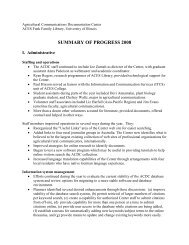
![La musa galante [microform] - University Library](https://img.yumpu.com/50760818/1/190x222/la-musa-galante-microform-university-library.jpg?quality=85)


